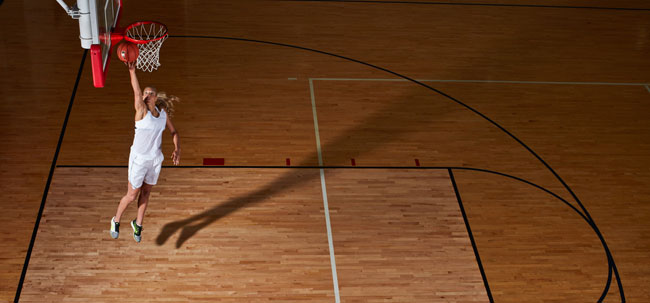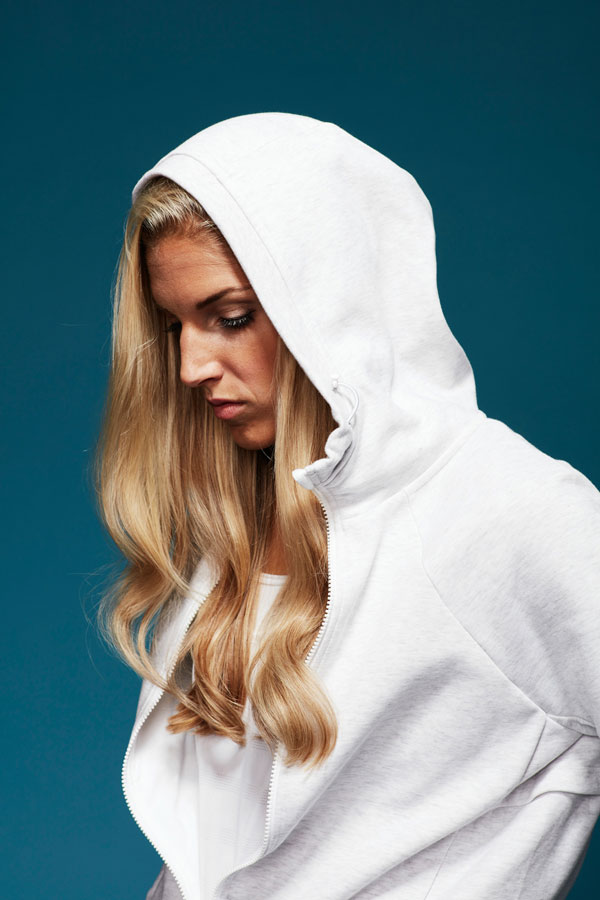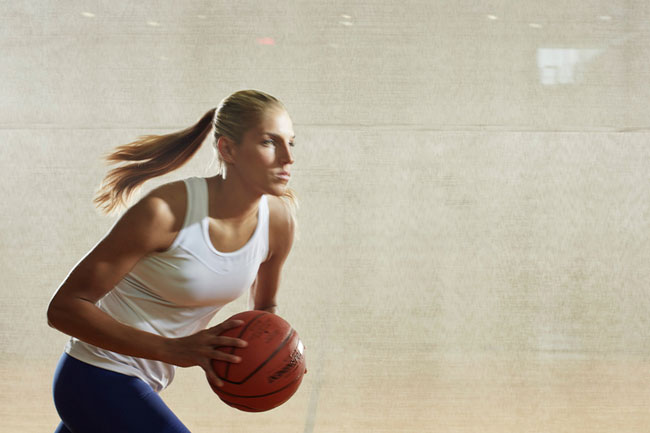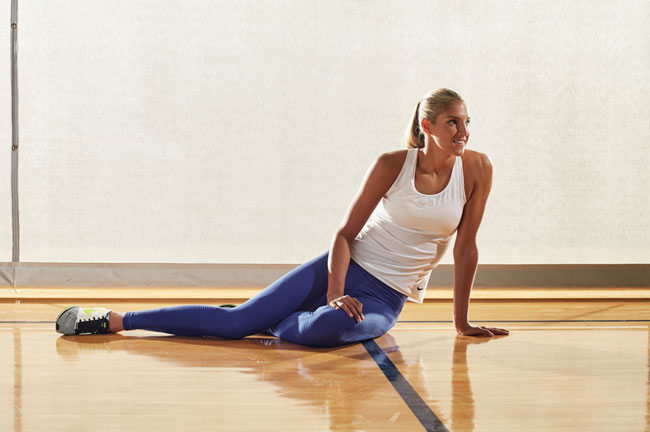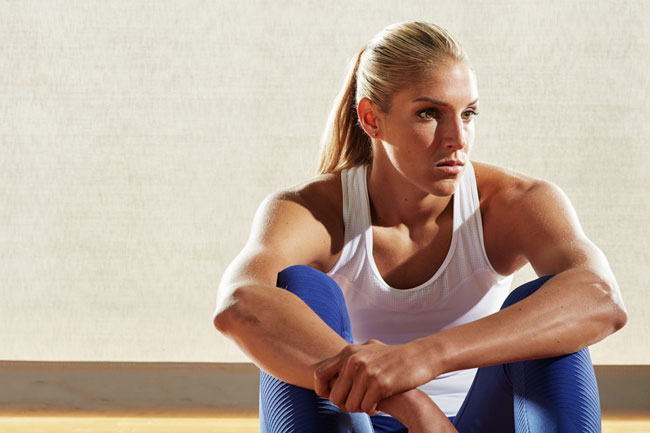In the glittering heart of Gotham, at a swank TriBeCa gala fit for a tuxedoed Bruce Wayne, a newly minted superhero soars toward an unseen basketball hoop, a flaring silk of blond hair trailing like a cape.
A few feet away, in heels and a form-hugging gown, a very tall blond woman who more than passingly resembles the leaping figure mulls the Marvel poster like a patron at a gallery, examining the main image of the subject cradling a basketball like a deity palming a planet, her hair swept back like Athena.
A small grin, then a full-on smile blossoms as she reads the character’s name.
“I hadn’t seen this,” she says to a friend. “Pretty cool, huh? Full-Court Goddess. I’ll take that.”
So, too, will her employer, the Chicago Sky—to say nothing of the celebrity-starved WNBA itself and, when it comes down to it, the whole of women’s sports, always on the hunt for relevance in a world dominated on most every level by the men’s game.
Even in Chicago, Elena Delle Donne has yet to ascend to the household-name firmament, no matter how mellifluously that name of hers rolls off the tongue. And this despite the fact that she ranks, arguably, as the greatest female basketball player in the world—a bona fide superstar playing in your own backyard.
At 26 and in her fourth year with the Sky, she has, in short order, gone from being the face of a franchise to the face of a league, and soon, if Nike and Gatorade have their way (as they so often do), she’ll be the very face of women's sports in general. Delle Donne seems made for the role—attractive and personable, racking up otherworldly stats that place her firmly on a Hall of Fame track. “Elena,” says newly named WNBA president Lisa Borders, “is already an iconic player. She is a perfect example of what the league stands for.”
Walking past the poster into the neon-lit, loungy loft space, Delle Donne, reigning MVP of the WNBA, author of one of the great seasons by any basketball player of any gender, looks at ease rubbing elbows with the athletic elite at ESPNW’s inaugural Impact25 Gala, celebrating the people who make the biggest mark in women’s sports. The wad of chewing gum she’s working offers a tell of unpretentiousness.
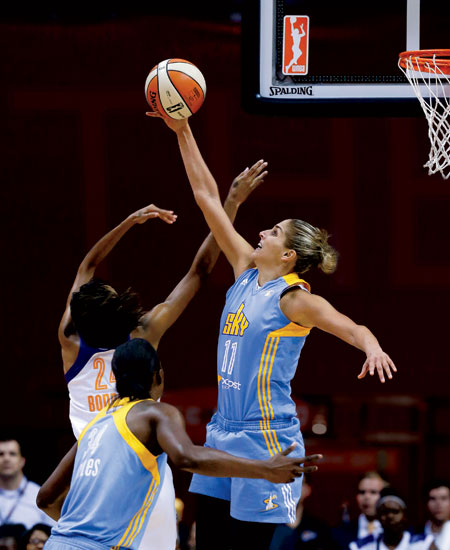
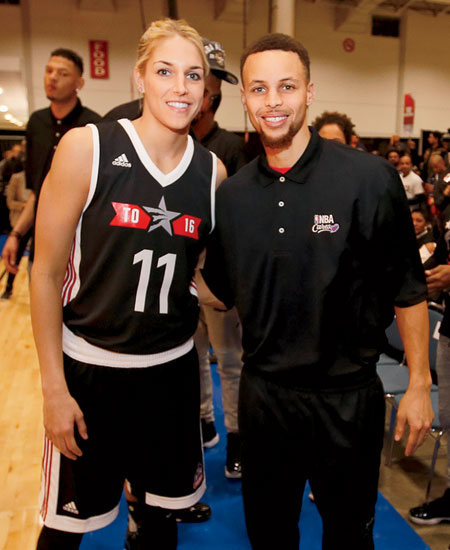
There was a time, she’ll confess, when being thrust into a Champagne-soaked, media-heavy event like this would have rattled her. “At the beginning of my professional career, it was all kind of like new and crazy, and I was really nervous,” Delle Donne says. “But I’ve done so much of it now, it’s kind of second nature. I enjoy it.”
That includes a role in Nike’s recent “Snow Day” commercial, a lavish production featuring an ensemble of high-profile athletes plucked from the company’s stable of stars. In it, Delle Donne stalks through a Hollywood-created semiblizzard to join a pickup football game (tackle, of course) with the likes of Rob Gronkowski, the New England Patriots’ ultimate-bro tight end. What’s more, she’s being showcased in ways that transcend basketball: She has been photographed for an upcoming feature in Vogue, and in August she will take the world stage as a key member of the U.S. Olympic team.
Not only does Delle Donne seem to be gaining confidence in the spotlight, she’s learning to leverage it. Last December, when former NBA player and notorious bonehead Gilbert Arenas suggested on social media that the WNBA would score better ratings if its players performed in thongs, Delle Donne shredded him with a razor-sharp tweet: “Women were not put on this earth just for men to look at. We are people. We have a purpose. We are role models. I am an athlete first and foremost. #ByeGilbert.”
Then, in March, she offered her own suggestion for injecting excitement into the league: lowering the rim to nine feet to allow more dunks. (The 6-foot-5 Delle Donne is one of the few players in the WNBA who can slam on a standard hoop; a video of her throwing down a one-handed jam in practice while wearing a Batman costume went viral recently.) The backlash was as pointed as it was predictable: One of the league’s most venerable stars, Diana Taurasi, mocked the notion, saying that the league “might as well put us in skirts and back in the kitchen.” Delle Donne didn't back down, pointing out that the decision to make the WNBA three-point line closer than the NBA’s “wasn’t considered degrading.”
It’s all a far cry from when, just three years ago, the Sky’s owner and coaches had to sit the deferential rookie down and tell her to assert herself more. And it’s even more remarkable considering that less than 10 years ago, at a time when attention was just starting to be heaped on her, Delle Donne vowed not only to quit playing but also to never touch a basketball again.
It’s hardly a revelation to say that the odds of any given child, male or female, becoming a professional athlete, much less ascending to the very top of a sport, are Powerball long. The right physical frame, athleticism, desire, coaching, support, durability, and well-timed breaks along the way all have to collide perfectly. And even then, sports history is replete with examples of can’t-miss prospects who did, sometimes tragically.
But if anyone seemed to be that one-in-a-million lock, it was Elena Delle Donne. Her father, Ernie, a real estate developer, and her mother, Joan, a former special education teacher, were both athletes (Ernie, 6-foot-6, played golf for Columbia University; Joan, 6-foot-2, was a high school swimmer and tennis player), and they were committed to helping their daughter achieve. Living on a 35-acre property outside of Wilmington, Delaware, gave Delle Donne and her older brother, an all-state high school quarterback, the room they needed to roam and play.
After family, sports came in a close second for Delle Donne, and basketball was her favorite. She first picked up a ball at age 4, after seeing her brother play. “I was obsessed and wanted to do everything he was doing,” she recalls. At halftime of his youth-league games, she would run onto the court and start shooting.
From early on, her height cast her as a center. Her father, however, encouraged her to approach the game with the mindset of a ball-handling guard. “His vision,” says Delle Donne, “was that he knew I was going to be tall, and if I was really tall and had guard skills, that’s something different that hadn’t been seen before.”
She pushed herself, too. “I always told myself that someone else was working harder,” she says. “I went a little crazy.” While in high school at Ursuline Academy in Wilmington, she would rise at 5:30 a.m. to run treadmill sprints and lift weights before class. She led the private Catholic school to three straight state titles on her way to becoming the top-rated prospect in the country.
College offers soon choked the Delle Donne mailbox. “We had to have a carton under the mailbox because there were so many letters,” she recalls. “It started to become absurd.”
One of the recruiters tracking her was Pokey Chatman, now head coach of the Chicago Sky but at that time the coach at Louisiana State University. “She was just so unlike anything I’d ever seen,” says Chatman. “You would sneak off to the gym and watch her play just because she was such a special player—the size, the athleticism, the enthusiasm, the calmness, the unlimited ceiling at such an early age.”
What no one realized, however, was the resentment Delle Donne was feeling toward what her life had become and toward the sport she had once loved. “I was first and always Elena the basketball player,” she explains. “Everybody thought it was the coolest thing that I got a scholarship offer in the eighth grade, but in reality that was a terrifying thing to me. I thought, Basketball is going to take me away from my home and my family. And as a little eighth grader, that’s a really scary thing that you shouldn’t have to think about. So instead of embracing the recruiting process, I was miserable about it.”
By her senior year, she didn’t just dislike basketball—she despised it. “Every time I stepped on the court, I was dreading it. I had a nauseous feeling. Something that I absolutely used to love doing, that took stress from me, was now adding the worst pressure I’d ever known. It was like my biggest secret. At some point it was going to explode—and it did.”
The detonation came in 2008. Delle Donne had agreed to play for the University of Connecticut, long the mecca of women’s college basketball. For a female hoops player, landing an invitation from legendary coach Geno Auriemma is akin to an actor getting a call from Steven Spielberg. “Geno wants you, you have to take it,” says Delle Donne. “So I just kind of did what I thought everybody expected me to do and committed.”
She immediately regretted it. “The whole time, I knew it wasn’t right. But I was so introverted about it. I didn’t share these feelings. And it all built up to the moment where I left.”
After two days on campus for a summer program, Delle Donne shocked her friends and family and the basketball world by renouncing her decision. She wasn’t going to play for the Huskies after all—or anyone else, for that matter. “I decided I was putting away the basketball and never touching one again,” she says.
The change of heart triggered all kinds of wild speculation. “There were ridiculous rumors, like I was pregnant. Pundits were saying I couldn’t hack it.” Even her parents were flabbergasted. “They were like, ‘Are you sure? Are you just homesick? We can figure this out. Don’t throw away this incredible experience.’ It took them a while to understand what was really going on.”
She spent the summer at home, an 18-year-old adrift. She had come to loathe basketball, but what was she, who was she, without it? She hung out with her severely disabled older sister, Lizzie, who has cerebral palsy and is deaf and blind. Communicating through hand-over-hand sign language, the sisters had forged a close bond. Delle Donne became deeply involved in the Special Olympics. (These days, she serves as a global ambassador for the organization and routinely invites disabled young people to participate in her basketball camps.) She began to find something she says she only then realized she’d lost: “myself outside of basketball.”
A week before classes were to start that fall, she heeded her mother’s advice and enrolled at the University of Delaware, just 10 miles from home. A high school friend who heard the news texted her on a whim to see if Delle Donne had any interest in joining her on the school’s volleyball team. Delle Donne agreed and, true to her preternatural athletic gifts, wound up being named to the all-conference rookie team. But unlike basketball, volleyball did not consume her—or make her miserable. She made friends, hung out, slept late—in other words, experienced a normal college life.
All the while, she made a point of avoiding anything to do with basketball, including watching it on TV. But one Sunday in April of her freshman year, alone in her dorm room, she flicked on the NCAA women’s Final Four. She found herself sucked into the excitement, and when the games were over, she reached for her cell phone.
“What on earth am I doing?” she asked her father. “I’ve been playing basketball my entire life, and I’ve given away this talent that I had and all the work that went into it.”
Her dad responded, “Elena, you can pick up a ball whenever you want. It doesn’t have to be over.”
She began sneaking into the university’s gym at midnight to shoot hoops. If people knew what she was up to, the media circus would begin all over. She didn’t want that scrutiny. She needed to make sure for herself that she was back.
It didn’t take long. From the first time she touched a ball, the first time a jumper ripped the net, she knew. The thrill felt like it had when she was a kid. With each shot, each drive to the hoop, she felt the joy of playing return. “I realized how much I missed it.”
She decided to return to basketball but to remain at Delaware, even though it was a smaller–conference school. Questions—legitimate ones, given what had happened—swirled. Was she really back? She didn’t hesitate. Yes. “I’d just grown up a lot in that year after everything I’d been through,” she says.
If she had collected any rust during her year off, she quickly shed it. Her first season, she averaged nearly 27 points a game—third highest for a freshman in Division I history—and was voted conference player of the year.
Just as she rekindled her love of the game, however, a mysterious illness threatened to snatch the sport away. At the beginning of her sophomore season, she felt sluggish, drained, foggy. She missed 11 straight games. “I had no idea what was going on,” she says. “So many doctors told me there was nothing wrong, but I was exhausted—sleeping 18 hours a day. I had bad migraines, extreme muscle fatigue and soreness. I lost, like, 35 pounds. I was withering away, and nobody was giving me answers.”
Finally, doctors discovered the problem. Delle Donne had Lyme disease, a bacterial infection transmitted primarily by deer ticks. To this day, she isn’t sure how she contracted it, but says, “My family lives out in the country, and there are deer all around our house.”
She bounced back in her junior year, topping the nation in scoring with more than 28 points a game. But then the Lyme disease flared up again, forcing her to miss four games her senior season. Even so, she led Delaware to the Sweet 16 of the NCAA women’s tournament.
Her comeback had been remarkable. Still, as the 2013 WNBA draft neared, questions dogged her: What about Connecticut? Was she truly committed to the game now? And what about the Lyme disease? Among those searching for answers was Chicago Sky owner Michael Alter. His team had the second pick in the draft. Based on pure basketball ability, Delle Donne was the obvious choice after the consensus first pick, 6-foot-8 Brittney Griner from Baylor.
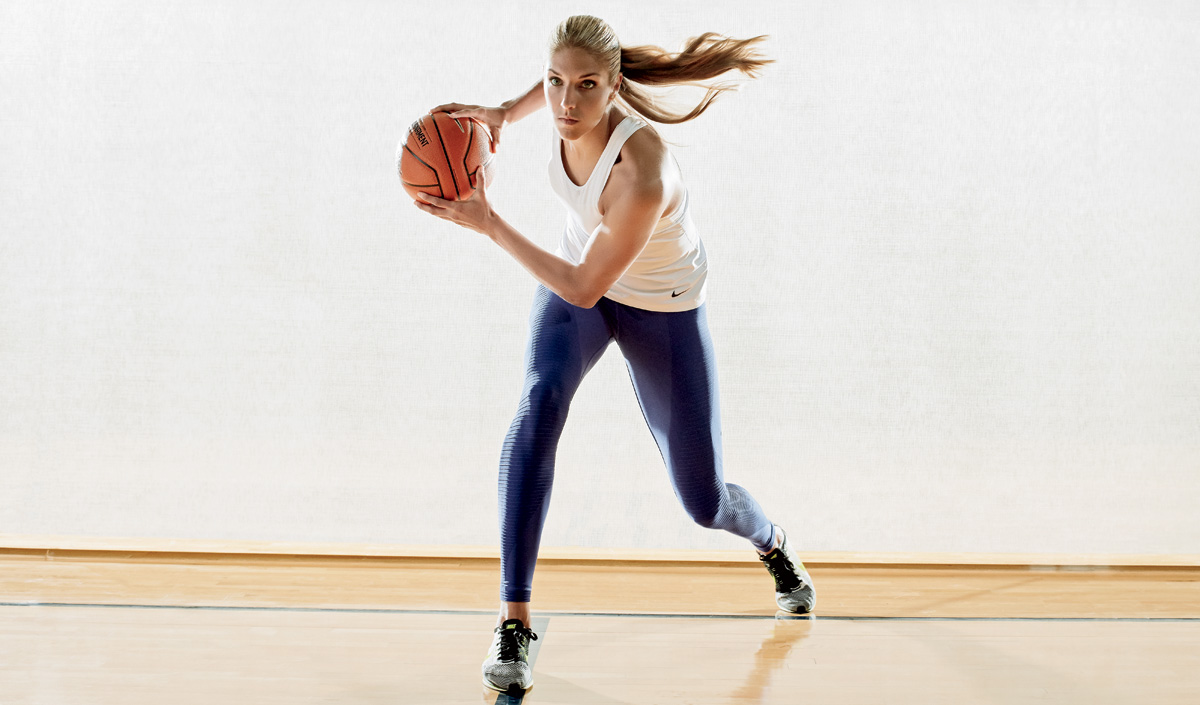
“It was very clear she was a phenomenal, unique talent,” Alter says of Delle Donne. “Being six-five with guard skills to handle the ball, the ability to shoot 3-pointers—there are just very few players like her around.” He liked everything he saw from her on the court: her work ethic, her basketball smarts, her focus. “If you watch her play, her expression doesn’t change a lot. Up or down, she’s just very even keeled.”
What he couldn’t afford, though, was a repeat of what had happened at Connecticut. Delle Donne understood the concern and so didn’t mind being grilled by Alter. She remembers the predraft interview well: “It was very much like, ‘Are we good? Are you committed to the game? If we pick you, are you actually going to come? Are you going to burn out again?’ ”
“Just watch,” Delle Donne reassured Alter. “I’ll be fine.”
Impressed with her poise and her explanation for having quit Connecticut, Alter went from skeptical to certain. “I started thinking it takes a lot of guts to do what she did—as an 18-, 19-year-old, to recognize that, especially when you’re in the public spotlight.”
He still harbored doubts about her physically. Could the Lyme disease come back? “We talked to her doctor, checked the medical records, trying to understand,” says Alter. “We were told she was fine.”
Nothing in her first season suggested otherwise. Her play vaulted her to the top of the fan voting for the 2013 WNBA All-Star Game starters, and she was named Rookie of the Year. She won over her teammates with her unselfishness. “Elena got a lot of publicity coming into the league—it’s like before she even played a game, she was a star,” says Sky point guard Courtney Vandersloot. “I was really impressed with how she carried herself and the humility she showed. She was just excited to be a part of Chicago, and she just wanted to win. That says a lot about her character.”
But things took a turn in her second season when Delle Donne felt the familiar, unmistakable wave of fatigue. The Lyme disease was back. “I was like, Oh my God, it’s here,” she recalls. “I thought it was behind me.”
Sent home to Delaware for a month of rest and megarounds of antibiotics, she fought her own doubts. “There was a point where I thought, Maybe I’m not going to be able to play basketball. Maybe this illness is just telling me I need to do something else. Which would be crazy, because now that I wanted to play, there was an illness that was not letting me.”
She participated in only 16 of the team’s 34 regular-season games that year, and often sparingly. But she returned at full speed for the playoffs. In the deciding game of the first round, the Sky fell behind by 17 with a little over eight minutes left. Delle Donne’s 34 points included the game winner, which sent the team to the second round. The Sky went on to the finals, but Delle Donne took an elbow to the back that slowed her, and the team was swept by the Brittney Griner–led Phoenix Mercury.
Her fans began to wonder: What would a season where no stars crossed look like? Will she ever be able to fully deliver?
The answers came when a relatively healthy Delle Donne enjoyed a breakout season in 2015. But things ended on a disappointing note when the Sky were upset in the first round of the playoffs.
“We fell really short,” she admits. In the past, she may have let it go at that or talked about improving her own game. But in February, three months before the start of this season, she was not mincing words. “There are going to be some changes that need to be made,” she told me. “Maybe acquire some different players.”
The WNBA has shown remarkable staying power. Now in its 20th season, it ranks as the longest-surviving professional sports league for women. Yet each year is a struggle. League-wide, average attendance dropped to 7,300 in 2015, a record low. (The Sky, which play at Allstate Arena in Rosemont, averaged just under 7,000; tickets cost as little as $16.) TV ratings, meanwhile, dipped 15 percent in the regular season and 21 percent during the finals.
“Women’s professional sports in our society have come a long way,” says Sky owner Alter, “but we’ve still got a long way to go in terms of cultural acceptance by the mainstream consumers of sports.”
WNBA salaries, which averaged $75,000 last year, are a pittance compared with those in the NBA, which, on average, exceed $4 million. “Don’t get me wrong, these women make a very nice living, particularly for a 21-year-old coming out of college,” Alter says. “But they absolutely deserve to get paid more money than they get.”
The reality of life in the WNBA is that most players, if they want to make a significant income, have to head overseas in the fall, when the league wraps up its 18- to 20-week season. A little more than half of WNBA players also compete in places such as Turkey, Italy, and China.
Delle Donne is one of the lucky ones. Crain’s Chicago Business estimates that her endorsements bring in $500,000 a year—perhaps more. And that allows her to stay put and spend more time with Lizzie and the rest of her family. And given that her Lyme disease could return at a moment’s notice, she doesn’t like to stray far from her doctors.
She has been working with former NBA star Steve Nash on a new diet—“lots of healthy fats so that I become a fat burner rather than a carbohydrate burner”—and feels healthier than ever. “But,” she quickly adds, “you never know.”
Though she typically returns to Delaware in the off-season, she has developed a deep affection for Chicago in the time she has spent here. She threw out the first pitch at the Cubs’ home opener in 2013 and named her adopted Great Dane Wrigley. “I love the city,” she says. “There’s just such a great vibe. When I first moved to Chicago to play, I was like, Wait, there’s an ocean? There’s no way there’s an ocean. I had no idea a lake could be that large.”
If Delle Donne comes off as a little, well, wholesome, that is not such a bad thing in the eyes of the WNBA, which suffered a PR hit last season at the hands of one of its other stars. Griner and her fiancée, fellow WNBA player Glory Johnson, were arrested for assaulting each other. The league suspended both players (who have since married and separated) for seven games.
Given that, it’s clear why the league and star makers such as Nike are hitching themselves to Delle Donne. “We need every player to exhibit the kind of leadership that Elena is exhibiting,” says league president Borders.
Adds Alter: “She is the future of the WNBA, in my humble opinion, both on and off the court. She has the potential to be one of the greatest players ever.”
Gliding through the glitterati at the ESPNW Impact25 Gala, Delle Donne, the Full-Court Goddess, wears no cape or tights and displays no extraordinary powers beyond a friendly smile, yet she still looks the part of a superhero. One after another, fans and fellow honorees approach to either pull her into hugs or whip out cell phones for grinning selfies.
One of the tiniest and least-known athletes at the star-studded event was also, not coincidentally, the one Delle Donne most wanted to meet. Like her, Olivia Quigley, a sprinter and Special Olympian who has autism, has faced both deep uncertainty and an ongoing health threat. Diagnosed in February 2015 with breast cancer, Quigley continued to train for that summer’s Special Olympics World Games despite undergoing chemotherapy. She won two gold medals.
In the wilderness of her self-doubt about basketball, Delle Donne had considered becoming a special education teacher, like her mother was, where she could work with children who, like her sister, face real challenges.
The two hugged—the moment, captured by a horde of cameras, one of the night’s emotional highlights. After the event, Delle Donne headed back to her hotel. She had an early train ride back to Delaware the next morning—a superstar still able to travel in relative anonymity. For now.
More Photos from the Elena Delle Donne Cover Shoot
